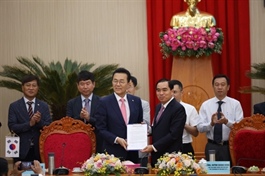Vietnamese government voices concern over companies' market exits
Vietnamese government voices concern over companies' market exits
Several multi-sectorial giants have offloaded their assets and withdrawn from the local market, causing concerns in the Vietnamese government over the current state of the economy.

Firms are struggling with high lending rates and obstacles to loan access, the government said in its recent report sent to the lawmaking National Assembly on the economic performance in 2022 and socio-economic growth plans in 2023.
The number of enterprises that were newly established and returned to the market in the first four months of the year fell two percent year on year, at some 78,900.
Meanwhile, 77,000 companies pulled out of the market in the four-month period, up 25.1 percent from the same period last year.
The mass market exit might worsen as global uncertainties continue to affect the Vietnamese economy, particularly as the number of orders declines and material prices and lending rates soar, according to the government.
Vietnam recorded 3.32 percent gross domestic product growth in the first quarter of the year, well below the target set by the central government.
In addition, bond maturity piled pressure on enterprises, mainly those active in the real estate sector. As such, several major firms sold their assets at low prices or merged with others to relieve financial distress and maintain production and business operations, according to the report.
Speaking on the solutions to the hardship, the government was determined to ensure macroeconomic stability, control inflation, boost socio-economic development, and shore up the adaptability and resilience of the banking and financial system.
The government pledged to focus on supporting businesses and residents in order to reduce input costs, backing production, and enhancing foreign investment attraction.
Among the government’s other priorities are speeding up public capital disbursement and the economic recovery and growth plan, improving the business and investment climate, and removing hurdles related to corporate bonds and the monetary policy.
Furthermore, Vietnam will continue to lower interest rates, pour capital into spearhead sectors, and raise the capability of accessing loans for firms.

























